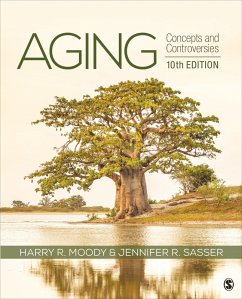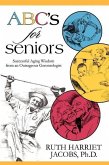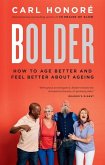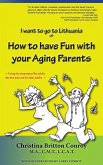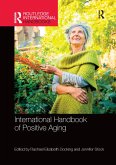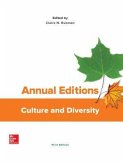- Broschiertes Buch
- Merkliste
- Auf die Merkliste
- Bewerten Bewerten
- Teilen
- Produkt teilen
- Produkterinnerung
- Produkterinnerung
Aging: Concepts and Controversies is structured to encourage a style of teaching and learning that goes beyond conveying facts and methods. This innovative text focuses on controversies and questions rather than on assimilating facts or creating a single "correct" view about aging or older people.
Andere Kunden interessierten sich auch für
![Psychology of Aging Psychology of Aging]() Sara J MargolinPsychology of Aging198,99 €
Sara J MargolinPsychology of Aging198,99 €![ABC's for Seniors: Successful Aging Wisdom from an Outrageous Gerontologist ABC's for Seniors: Successful Aging Wisdom from an Outrageous Gerontologist]() Ruth Harriet JacobsABC's for Seniors: Successful Aging Wisdom from an Outrageous Gerontologist25,99 €
Ruth Harriet JacobsABC's for Seniors: Successful Aging Wisdom from an Outrageous Gerontologist25,99 €![Seven Strategies for Positive Aging Seven Strategies for Positive Aging]() Robert D. HillSeven Strategies for Positive Aging23,99 €
Robert D. HillSeven Strategies for Positive Aging23,99 €![Bolder Bolder]() Carl HonoreBolder15,99 €
Carl HonoreBolder15,99 €![How to have Fun with your Aging Parents How to have Fun with your Aging Parents]() Christina Britton ConroyHow to have Fun with your Aging Parents12,99 €
Christina Britton ConroyHow to have Fun with your Aging Parents12,99 €![International Handbook of Positive Aging International Handbook of Positive Aging]() International Handbook of Positive Aging74,99 €
International Handbook of Positive Aging74,99 €![Annual Editions: Culture and Diversity Annual Editions: Culture and Diversity]() Claire RubmanAnnual Editions: Culture and Diversity74,99 €
Claire RubmanAnnual Editions: Culture and Diversity74,99 €-
-
-
Aging: Concepts and Controversies is structured to encourage a style of teaching and learning that goes beyond conveying facts and methods. This innovative text focuses on controversies and questions rather than on assimilating facts or creating a single "correct" view about aging or older people.
Hinweis: Dieser Artikel kann nur an eine deutsche Lieferadresse ausgeliefert werden.
Hinweis: Dieser Artikel kann nur an eine deutsche Lieferadresse ausgeliefert werden.
Produktdetails
- Produktdetails
- Verlag: Sage Publications
- 10th edition
- Seitenzahl: 640
- Erscheinungstermin: 18. August 2020
- Englisch
- Abmessung: 231mm x 183mm x 23mm
- Gewicht: 975g
- ISBN-13: 9781544371719
- ISBN-10: 1544371713
- Artikelnr.: 61267246
- Herstellerkennzeichnung
- Libri GmbH
- Europaallee 1
- 36244 Bad Hersfeld
- gpsr@libri.de
- Verlag: Sage Publications
- 10th edition
- Seitenzahl: 640
- Erscheinungstermin: 18. August 2020
- Englisch
- Abmessung: 231mm x 183mm x 23mm
- Gewicht: 975g
- ISBN-13: 9781544371719
- ISBN-10: 1544371713
- Artikelnr.: 61267246
- Herstellerkennzeichnung
- Libri GmbH
- Europaallee 1
- 36244 Bad Hersfeld
- gpsr@libri.de
Harry R. Moody is a graduate of Yale University and received his Ph.D. in philosophy from Columbia University. He has taught philosophy at Columbia University, Hunter College, New York University, and the University of California at Santa Cruz. He recently retired as Vice President and Director of Academic Affairs for AARP in Washington, DC. He is currently Visiting Professor at Tohoku University in Japan, and Distinguished Visiting Professor at Fielding Graduate University. Dr. Moody previously served as Executive Director of the Brookdale Center on Aging at Hunter College and Chairman of the Board of Elderhostel (now Road Scholar). Moody is the author of over 100 scholarly articles, as well as a number of books including: Abundance of Life: Human Development Policies for an Aging Society (Columbia University Press, 1988) and Ethics in an Aging Society (Johns Hopkins University Press, 1992). His most recent book, The Five Stages of the Soul, was published by Doubleday Anchor Books and has been translated into seven languages worldwide. He is the editor of a newsletter, "Human Values in Aging," reaching 10,000 subscribers each month. In 2011 he received the Lifetime Achievement Award from the American Society on Aging and in 2008 he was named by Utne Reader Magazine as one of "50 Visionaries Who Are Changing Your World."
Preface
Acknowledgments
About the Authors
Part 1: Basic Concepts I. A Life Course Perspective on Aging
Age Identification
The Stages of Life
The Life Course and Aging
Traditional Theories of Aging
Influences on the Life Course
Aging in the 21st Century
The Biology of Aging
Aging and Psychological Functioning
Conclusion
Chapter 1: Controversy 1. Does Old Age Have Meaning?
The Meaning of Age
Leisure Activities in Later Life
Religion and Spirituality
Gerontology and the Meaning of Age
Activity or Reflection?
Questions for Writing, Reflection, and Debate
Chapter 2: Controversy 2. Why Do Our Bodies Grow Old?
The Process of Biological Aging
Biological Theories of Aging
Is Aging Inevitable?
Compression or Prolongation of Morbidity?
Questions for Writing, Reflection, and Debate
Chapter 3: Controversy 3. Do Intelligence and Creativity Decline With Age?
Elements of Cognitive Function
The Classic Aging Pattern
Measures of Late-Life Intelligence
Studies of Age and Cognitive Function
Correlates of Cognitive Stability
Creativity in an Aging Population
Questions for Writing, Reflection, and Debate
Part 2: Basic Concepts II. Aging, Health Care, and Society
The Challenge of Longevity
Epidemiology of Aging
Economics of Health Care
Long-Term Care
Self-Determined Death
Conclusion
Chapter 4: Controversy 4. Should We Ration Health Care for Older People?
Precedents for Health Care Rationing
The Justification for Age-Based Rationing
Rationing as a Cost-Saving Plan
The Impetus for Rationing
Cost Versus Age
Alternative Approaches to Rationing
Euthanasia and Assisted Suicide
The Debate Over Age-Based Rationing
Questions for Writing, Reflection, and Debate
Chapter 5: Controversy 5. Should Families Provide for Their Own?
Aging and the American Family
Abandonment or Independence?
Family Responsibility
Medicaid and Long-Term Care
Financing Long-Term Care
Medicaid Planning
Questions for Writing, Reflection, and Debate
Chapter 6: Controversy 6. Should Older People Be Protected From Bad
Choices?
The Vulnerabilities of Older People
Interfering When People Make Bad Choices
Elder Abuse and Mistreatment
Perceptions of Quality of Life
Sexuality in Later Life
Crime and Older Adults
Intervention in the Lives of Vulnerable Older Adults
Questions for Writing, Reflection, and Debate
Chapter 7: Controversy 7. Should People Have the Choice to End Their Lives?
Depression and Suicide
The "Right to Die"
Outlook for the Future
Questions for Writing, Reflection, and Debate
Part 3: Basic Concepts III. Social and Economic Outlook for an Aging
Society
The Varieties of Aging Experience
The Economic Status of Older Americans
Public Policy on Aging
Conclusion
Chapter 8: Controversy 8. Should Age or Need Be the Basis for Entitlement?
A Tale of Two Generations
Justice Between Generations
The Least-Advantaged Older Adults
Help for Those Most in Need
The Targeting Debate
Questions for Writing, Reflection, and Debate
Chapter 9: Controversy 9. What Is the Future for Social Security?
Main Features of Social Security
Success-and Doubt
Pay as You Go
Social Security Trust Fund
Eligibility
Privatization
Women and Social Security
Debate Over Social Security
Questions for Writing, Reflection, and Debate
Chapter 10: Controversy 10. Is Retirement Obsolete?
History of Retirement
Origins of Late-Life Leisure
Changes in the American Economy
A New View of Retirement
Debate Over Retirement Policy
Questions for Writing, Reflection, and Debate
Chapter 11: Controversy 11. Aging Boomers: Boom or Bust?
Who Are the Boomers?
What Is a Generation? Age-Period-Cohort Analysis
Social Construction of the Boomer Phenomenon
Boomers in the Years Ahead
Questions for Writing, Reflection, and Debate
Chapter 12: Controversy 12. The New Aging Marketplace: Hope or Hype?
The New Customer Majority
Market Sectors Likely to Grow
What Do Older Consumers Want?
Limits of the Marketplace Model
Questions for Writing, Reflection, and Debate
Epilogue: Finding Your Place in an Aging Society
Appendix: Tips for Conducting Your Own Research in Gerontology
Glossary
Bibliography
Index
Acknowledgments
About the Authors
Part 1: Basic Concepts I. A Life Course Perspective on Aging
Age Identification
The Stages of Life
The Life Course and Aging
Traditional Theories of Aging
Influences on the Life Course
Aging in the 21st Century
The Biology of Aging
Aging and Psychological Functioning
Conclusion
Chapter 1: Controversy 1. Does Old Age Have Meaning?
The Meaning of Age
Leisure Activities in Later Life
Religion and Spirituality
Gerontology and the Meaning of Age
Activity or Reflection?
Questions for Writing, Reflection, and Debate
Chapter 2: Controversy 2. Why Do Our Bodies Grow Old?
The Process of Biological Aging
Biological Theories of Aging
Is Aging Inevitable?
Compression or Prolongation of Morbidity?
Questions for Writing, Reflection, and Debate
Chapter 3: Controversy 3. Do Intelligence and Creativity Decline With Age?
Elements of Cognitive Function
The Classic Aging Pattern
Measures of Late-Life Intelligence
Studies of Age and Cognitive Function
Correlates of Cognitive Stability
Creativity in an Aging Population
Questions for Writing, Reflection, and Debate
Part 2: Basic Concepts II. Aging, Health Care, and Society
The Challenge of Longevity
Epidemiology of Aging
Economics of Health Care
Long-Term Care
Self-Determined Death
Conclusion
Chapter 4: Controversy 4. Should We Ration Health Care for Older People?
Precedents for Health Care Rationing
The Justification for Age-Based Rationing
Rationing as a Cost-Saving Plan
The Impetus for Rationing
Cost Versus Age
Alternative Approaches to Rationing
Euthanasia and Assisted Suicide
The Debate Over Age-Based Rationing
Questions for Writing, Reflection, and Debate
Chapter 5: Controversy 5. Should Families Provide for Their Own?
Aging and the American Family
Abandonment or Independence?
Family Responsibility
Medicaid and Long-Term Care
Financing Long-Term Care
Medicaid Planning
Questions for Writing, Reflection, and Debate
Chapter 6: Controversy 6. Should Older People Be Protected From Bad
Choices?
The Vulnerabilities of Older People
Interfering When People Make Bad Choices
Elder Abuse and Mistreatment
Perceptions of Quality of Life
Sexuality in Later Life
Crime and Older Adults
Intervention in the Lives of Vulnerable Older Adults
Questions for Writing, Reflection, and Debate
Chapter 7: Controversy 7. Should People Have the Choice to End Their Lives?
Depression and Suicide
The "Right to Die"
Outlook for the Future
Questions for Writing, Reflection, and Debate
Part 3: Basic Concepts III. Social and Economic Outlook for an Aging
Society
The Varieties of Aging Experience
The Economic Status of Older Americans
Public Policy on Aging
Conclusion
Chapter 8: Controversy 8. Should Age or Need Be the Basis for Entitlement?
A Tale of Two Generations
Justice Between Generations
The Least-Advantaged Older Adults
Help for Those Most in Need
The Targeting Debate
Questions for Writing, Reflection, and Debate
Chapter 9: Controversy 9. What Is the Future for Social Security?
Main Features of Social Security
Success-and Doubt
Pay as You Go
Social Security Trust Fund
Eligibility
Privatization
Women and Social Security
Debate Over Social Security
Questions for Writing, Reflection, and Debate
Chapter 10: Controversy 10. Is Retirement Obsolete?
History of Retirement
Origins of Late-Life Leisure
Changes in the American Economy
A New View of Retirement
Debate Over Retirement Policy
Questions for Writing, Reflection, and Debate
Chapter 11: Controversy 11. Aging Boomers: Boom or Bust?
Who Are the Boomers?
What Is a Generation? Age-Period-Cohort Analysis
Social Construction of the Boomer Phenomenon
Boomers in the Years Ahead
Questions for Writing, Reflection, and Debate
Chapter 12: Controversy 12. The New Aging Marketplace: Hope or Hype?
The New Customer Majority
Market Sectors Likely to Grow
What Do Older Consumers Want?
Limits of the Marketplace Model
Questions for Writing, Reflection, and Debate
Epilogue: Finding Your Place in an Aging Society
Appendix: Tips for Conducting Your Own Research in Gerontology
Glossary
Bibliography
Index
Preface
Acknowledgments
About the Authors
Part 1: Basic Concepts I. A Life Course Perspective on Aging
Age Identification
The Stages of Life
The Life Course and Aging
Traditional Theories of Aging
Influences on the Life Course
Aging in the 21st Century
The Biology of Aging
Aging and Psychological Functioning
Conclusion
Chapter 1: Controversy 1. Does Old Age Have Meaning?
The Meaning of Age
Leisure Activities in Later Life
Religion and Spirituality
Gerontology and the Meaning of Age
Activity or Reflection?
Questions for Writing, Reflection, and Debate
Chapter 2: Controversy 2. Why Do Our Bodies Grow Old?
The Process of Biological Aging
Biological Theories of Aging
Is Aging Inevitable?
Compression or Prolongation of Morbidity?
Questions for Writing, Reflection, and Debate
Chapter 3: Controversy 3. Do Intelligence and Creativity Decline With Age?
Elements of Cognitive Function
The Classic Aging Pattern
Measures of Late-Life Intelligence
Studies of Age and Cognitive Function
Correlates of Cognitive Stability
Creativity in an Aging Population
Questions for Writing, Reflection, and Debate
Part 2: Basic Concepts II. Aging, Health Care, and Society
The Challenge of Longevity
Epidemiology of Aging
Economics of Health Care
Long-Term Care
Self-Determined Death
Conclusion
Chapter 4: Controversy 4. Should We Ration Health Care for Older People?
Precedents for Health Care Rationing
The Justification for Age-Based Rationing
Rationing as a Cost-Saving Plan
The Impetus for Rationing
Cost Versus Age
Alternative Approaches to Rationing
Euthanasia and Assisted Suicide
The Debate Over Age-Based Rationing
Questions for Writing, Reflection, and Debate
Chapter 5: Controversy 5. Should Families Provide for Their Own?
Aging and the American Family
Abandonment or Independence?
Family Responsibility
Medicaid and Long-Term Care
Financing Long-Term Care
Medicaid Planning
Questions for Writing, Reflection, and Debate
Chapter 6: Controversy 6. Should Older People Be Protected From Bad
Choices?
The Vulnerabilities of Older People
Interfering When People Make Bad Choices
Elder Abuse and Mistreatment
Perceptions of Quality of Life
Sexuality in Later Life
Crime and Older Adults
Intervention in the Lives of Vulnerable Older Adults
Questions for Writing, Reflection, and Debate
Chapter 7: Controversy 7. Should People Have the Choice to End Their Lives?
Depression and Suicide
The "Right to Die"
Outlook for the Future
Questions for Writing, Reflection, and Debate
Part 3: Basic Concepts III. Social and Economic Outlook for an Aging
Society
The Varieties of Aging Experience
The Economic Status of Older Americans
Public Policy on Aging
Conclusion
Chapter 8: Controversy 8. Should Age or Need Be the Basis for Entitlement?
A Tale of Two Generations
Justice Between Generations
The Least-Advantaged Older Adults
Help for Those Most in Need
The Targeting Debate
Questions for Writing, Reflection, and Debate
Chapter 9: Controversy 9. What Is the Future for Social Security?
Main Features of Social Security
Success-and Doubt
Pay as You Go
Social Security Trust Fund
Eligibility
Privatization
Women and Social Security
Debate Over Social Security
Questions for Writing, Reflection, and Debate
Chapter 10: Controversy 10. Is Retirement Obsolete?
History of Retirement
Origins of Late-Life Leisure
Changes in the American Economy
A New View of Retirement
Debate Over Retirement Policy
Questions for Writing, Reflection, and Debate
Chapter 11: Controversy 11. Aging Boomers: Boom or Bust?
Who Are the Boomers?
What Is a Generation? Age-Period-Cohort Analysis
Social Construction of the Boomer Phenomenon
Boomers in the Years Ahead
Questions for Writing, Reflection, and Debate
Chapter 12: Controversy 12. The New Aging Marketplace: Hope or Hype?
The New Customer Majority
Market Sectors Likely to Grow
What Do Older Consumers Want?
Limits of the Marketplace Model
Questions for Writing, Reflection, and Debate
Epilogue: Finding Your Place in an Aging Society
Appendix: Tips for Conducting Your Own Research in Gerontology
Glossary
Bibliography
Index
Acknowledgments
About the Authors
Part 1: Basic Concepts I. A Life Course Perspective on Aging
Age Identification
The Stages of Life
The Life Course and Aging
Traditional Theories of Aging
Influences on the Life Course
Aging in the 21st Century
The Biology of Aging
Aging and Psychological Functioning
Conclusion
Chapter 1: Controversy 1. Does Old Age Have Meaning?
The Meaning of Age
Leisure Activities in Later Life
Religion and Spirituality
Gerontology and the Meaning of Age
Activity or Reflection?
Questions for Writing, Reflection, and Debate
Chapter 2: Controversy 2. Why Do Our Bodies Grow Old?
The Process of Biological Aging
Biological Theories of Aging
Is Aging Inevitable?
Compression or Prolongation of Morbidity?
Questions for Writing, Reflection, and Debate
Chapter 3: Controversy 3. Do Intelligence and Creativity Decline With Age?
Elements of Cognitive Function
The Classic Aging Pattern
Measures of Late-Life Intelligence
Studies of Age and Cognitive Function
Correlates of Cognitive Stability
Creativity in an Aging Population
Questions for Writing, Reflection, and Debate
Part 2: Basic Concepts II. Aging, Health Care, and Society
The Challenge of Longevity
Epidemiology of Aging
Economics of Health Care
Long-Term Care
Self-Determined Death
Conclusion
Chapter 4: Controversy 4. Should We Ration Health Care for Older People?
Precedents for Health Care Rationing
The Justification for Age-Based Rationing
Rationing as a Cost-Saving Plan
The Impetus for Rationing
Cost Versus Age
Alternative Approaches to Rationing
Euthanasia and Assisted Suicide
The Debate Over Age-Based Rationing
Questions for Writing, Reflection, and Debate
Chapter 5: Controversy 5. Should Families Provide for Their Own?
Aging and the American Family
Abandonment or Independence?
Family Responsibility
Medicaid and Long-Term Care
Financing Long-Term Care
Medicaid Planning
Questions for Writing, Reflection, and Debate
Chapter 6: Controversy 6. Should Older People Be Protected From Bad
Choices?
The Vulnerabilities of Older People
Interfering When People Make Bad Choices
Elder Abuse and Mistreatment
Perceptions of Quality of Life
Sexuality in Later Life
Crime and Older Adults
Intervention in the Lives of Vulnerable Older Adults
Questions for Writing, Reflection, and Debate
Chapter 7: Controversy 7. Should People Have the Choice to End Their Lives?
Depression and Suicide
The "Right to Die"
Outlook for the Future
Questions for Writing, Reflection, and Debate
Part 3: Basic Concepts III. Social and Economic Outlook for an Aging
Society
The Varieties of Aging Experience
The Economic Status of Older Americans
Public Policy on Aging
Conclusion
Chapter 8: Controversy 8. Should Age or Need Be the Basis for Entitlement?
A Tale of Two Generations
Justice Between Generations
The Least-Advantaged Older Adults
Help for Those Most in Need
The Targeting Debate
Questions for Writing, Reflection, and Debate
Chapter 9: Controversy 9. What Is the Future for Social Security?
Main Features of Social Security
Success-and Doubt
Pay as You Go
Social Security Trust Fund
Eligibility
Privatization
Women and Social Security
Debate Over Social Security
Questions for Writing, Reflection, and Debate
Chapter 10: Controversy 10. Is Retirement Obsolete?
History of Retirement
Origins of Late-Life Leisure
Changes in the American Economy
A New View of Retirement
Debate Over Retirement Policy
Questions for Writing, Reflection, and Debate
Chapter 11: Controversy 11. Aging Boomers: Boom or Bust?
Who Are the Boomers?
What Is a Generation? Age-Period-Cohort Analysis
Social Construction of the Boomer Phenomenon
Boomers in the Years Ahead
Questions for Writing, Reflection, and Debate
Chapter 12: Controversy 12. The New Aging Marketplace: Hope or Hype?
The New Customer Majority
Market Sectors Likely to Grow
What Do Older Consumers Want?
Limits of the Marketplace Model
Questions for Writing, Reflection, and Debate
Epilogue: Finding Your Place in an Aging Society
Appendix: Tips for Conducting Your Own Research in Gerontology
Glossary
Bibliography
Index

